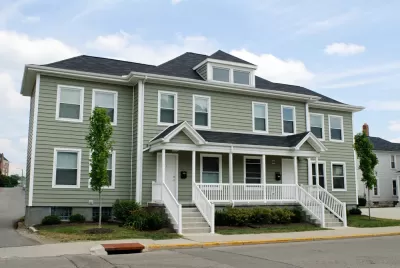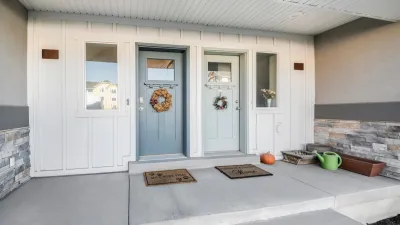A recent survey shows overwhelming support for denser housing options, with younger people and renters most likely to support ‘missing middle housing’ types.

“The results of a comprehensive new Zillow survey gauging the views of 12,000 adult residents in 26 major metro areas on the topic of neighborhood-densifying housing options show that a resounding majority of those polled support allowing forms of missing middle housing such as accessory dwelling units (ADUs) and duplexes/triplexes in their own figurative, and perhaps literal, backyards.”
Matt Hickman describes the survey results, noting that “Support for missing middle housing was strongest among younger age groups with 86 percent of Gen Zers (ages 18–27) and Millennials (ages 28–42) backing ADUs or duplexes/triplexes.” However, the majority of older respondents also supported lightly increased density. Meanwhile, “Support for missing middle housing in residential neighborhoods was strongest from those polled who identify as renters,” who can suffer most from volatile housing costs.
Younger people were also more likely to favor housing over parking. “Within the youngest Gen-Z age category, 72 percent of residents agreed that affordable housing is more important than free parking while in the oldest age group, boomers and the Silent Generation, slightly less than half of respondents were in agreement.”
In an all-too-common paradox, “While most respondents agreed that multi-family projects would prove beneficial by boosting the number of affordable housing options in their respective neighborhoods (68 percent), fewer overall (57 percent) indicated that they would actually support such a building being constructed.”
FULL STORY: Millennials and Gen Z strongly support “missing middle” housing, Zillow survey says

Maui's Vacation Rental Debate Turns Ugly
Verbal attacks, misinformation campaigns and fistfights plague a high-stakes debate to convert thousands of vacation rentals into long-term housing.

Planetizen Federal Action Tracker
A weekly monitor of how Trump’s orders and actions are impacting planners and planning in America.

San Francisco Suspends Traffic Calming Amidst Record Deaths
Citing “a challenging fiscal landscape,” the city will cease the program on the heels of 42 traffic deaths, including 24 pedestrians.

Defunct Pittsburgh Power Plant to Become Residential Tower
A decommissioned steam heat plant will be redeveloped into almost 100 affordable housing units.

Trump Prompts Restructuring of Transportation Research Board in “Unprecedented Overreach”
The TRB has eliminated more than half of its committees including those focused on climate, equity, and cities.

Amtrak Rolls Out New Orleans to Alabama “Mardi Gras” Train
The new service will operate morning and evening departures between Mobile and New Orleans.
Urban Design for Planners 1: Software Tools
This six-course series explores essential urban design concepts using open source software and equips planners with the tools they need to participate fully in the urban design process.
Planning for Universal Design
Learn the tools for implementing Universal Design in planning regulations.
Heyer Gruel & Associates PA
JM Goldson LLC
Custer County Colorado
City of Camden Redevelopment Agency
City of Astoria
Transportation Research & Education Center (TREC) at Portland State University
Jefferson Parish Government
Camden Redevelopment Agency
City of Claremont





























